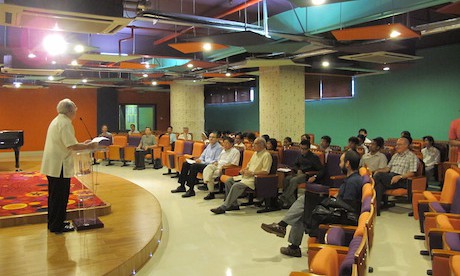The number, depth, and rapidity of changes in Chinese society over the last decade may obscure an unusual change within the academy: a markedly increased interest in the thought of Thomas Aquinas.
Although it may seem strange to many in the West, contemporary Chinese scholars find Thomas’s thought not simply fascinating, but of enduring relevance.
I have just spent one month at four Chinese universities, speaking of the ways in which Thomas’s understanding of the relationship among philosophy, theology, and the natural sciences can be used to disentangle contemporary confusion about the philosophical and theological implications of evolutionary biology and cosmology.
In Shanghai, Beijing, and Wuhan, I found receptive, enthusiastic audiences.
Most Chinese graduate students who study Western philosophy specialize in either German philosophy, with an emphasis on Kant or Hegel, or in some form of Anglo-American analytic philosophy, especially the philosophy of mind.
Still, I encountered those who were learning Greek and Latin in order to read Aristotle and Aquinas in their original languages.
One evening in Beijing, I discussed passages in Aristotle’s Physics with students who were taking a graduate seminar on Thomas Aquinas’ Commentary on Aristotle’s ‘On the Soul.’
One student from Fudan University in Shanghai wants to compare the ways in which certain Chinese thinkers search for metaphysical foundations of ethics with the way in which Thomas Aquinas does; another in Wuhan is examining the different senses of “science” in Thomas’s works.
The number of those studying Thomas may be small, but, as Aristotle observed, a beginning is more than half.
Wuhan’s Thomas Study Center
At the University of Wuhan, I spoke at a three-day conference dedicated to Thomas Aquinas and medieval philosophy.
The conference was jointly sponsored by the Thomas Study Center in the Department of Religious Science in the School of Philosophy of the University of Wuhan, Fu Jen Catholic University of Taiwan, and the Li Madou Center in Italy.
That there is a Thomas Study Center at a major Chinese university, and that it has been in existence for nearly two decades, may itself be surprising to many. Continue reading
Sources
Additional readingNews category: Features.




